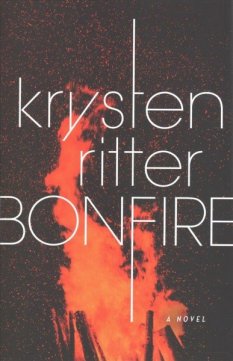 Today I’m talking about a fiery psychological thriller, Bonfire by Krysten Ritter. I’m not just excited to talk about the plot; I’m also stoked (get it?) to discuss her creative process and some surprising things we can learn from actors who are authors. Additionally, I’m touching on something that’s sparked my attention lately: how books like Gone Girl, The Woman in the Window, Sharp Objects, and Bonfire are either fanning the flames of the dead girl trope or burning it down. As usual, you can find Plotboilers on iTunes, Spotify, or right here on the Plotboilers website. Additionally, I love getting reviews and ratings on iTunes, so toss a few (or five?) stars my direction!
Today I’m talking about a fiery psychological thriller, Bonfire by Krysten Ritter. I’m not just excited to talk about the plot; I’m also stoked (get it?) to discuss her creative process and some surprising things we can learn from actors who are authors. Additionally, I’m touching on something that’s sparked my attention lately: how books like Gone Girl, The Woman in the Window, Sharp Objects, and Bonfire are either fanning the flames of the dead girl trope or burning it down. As usual, you can find Plotboilers on iTunes, Spotify, or right here on the Plotboilers website. Additionally, I love getting reviews and ratings on iTunes, so toss a few (or five?) stars my direction!
Books mentioned in this episode:
- Bonfire by Krysten Ritter
- Gone Girl by Gillian Flynn
- Sharp Objects by Gillian Flynn
- The Girl on the Train by Paula Hawkins
- The Woman in the Window by A.J. Finn
 Fredrik Backman is a Swedish writer best known for his books (A Man Called Ove, My Grandmother Asked Me to Tell You She’s Sorry, etc.) Today, I’m talking about one of his most recent works “Beartown,” a book that focuses on a small town’s relationship with ice hockey and the interwoven lives of the people who live there. Spoiler alert: I think this book is great, and I hope you do too. There are a ton of themes and ideas that come up in Beartown, but the one I’m most excited to discuss is loyalty. Is loyalty always a good thing? What happens when we misplace it? These are the questions Backman asks in the Beartown narrative – and just a few of the ones he answers as well.
Fredrik Backman is a Swedish writer best known for his books (A Man Called Ove, My Grandmother Asked Me to Tell You She’s Sorry, etc.) Today, I’m talking about one of his most recent works “Beartown,” a book that focuses on a small town’s relationship with ice hockey and the interwoven lives of the people who live there. Spoiler alert: I think this book is great, and I hope you do too. There are a ton of themes and ideas that come up in Beartown, but the one I’m most excited to discuss is loyalty. Is loyalty always a good thing? What happens when we misplace it? These are the questions Backman asks in the Beartown narrative – and just a few of the ones he answers as well. Join me as I discuss The Martian Chronicles by Ray Bradbury with guests Josiah and Benji! For those of you who have tuned in before, you might remember Josiah and Benji from a few months ago when we talked about
Join me as I discuss The Martian Chronicles by Ray Bradbury with guests Josiah and Benji! For those of you who have tuned in before, you might remember Josiah and Benji from a few months ago when we talked about
 Let’s talk about collectible books! First things first: Did you know there’s a difference between a first edition and a first printing? Both are cool, but many collectors prefer the first printing to the first edition. I’ll tell you why, and relay a few hacks I’ve discovered in my own book collecting pursuits to help you find and identify first and collectible editions of your favorite titles.
Let’s talk about collectible books! First things first: Did you know there’s a difference between a first edition and a first printing? Both are cool, but many collectors prefer the first printing to the first edition. I’ll tell you why, and relay a few hacks I’ve discovered in my own book collecting pursuits to help you find and identify first and collectible editions of your favorite titles.
 It’s Plotboilers’ tenth episode! In honor of my longstanding “don’t see the movie before you’ve read the book” tradition, I’m taking a look at A Wrinkle In Time by Madeleine L’Engle. It’s a short book, but there’s a lot to talk about so I’m going to cover characters, body image, and how the story depicts religion. Most importantly, I’m here to prove it’s never too late to finish your fourth-grade reading list.
It’s Plotboilers’ tenth episode! In honor of my longstanding “don’t see the movie before you’ve read the book” tradition, I’m taking a look at A Wrinkle In Time by Madeleine L’Engle. It’s a short book, but there’s a lot to talk about so I’m going to cover characters, body image, and how the story depicts religion. Most importantly, I’m here to prove it’s never too late to finish your fourth-grade reading list.